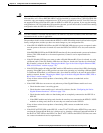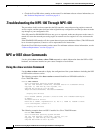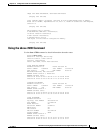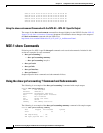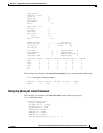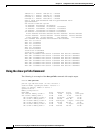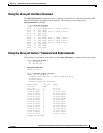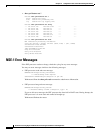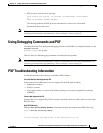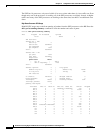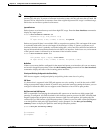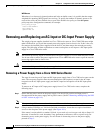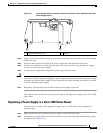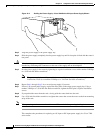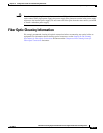
10-11
Network Processing Engine and Network Services Engine Installation and Configuration
OL-4448-12
Chapter 10 Configuration Tasks and Troubleshooting Information
Using Debugging Commands and PXF
• PXF processor crash and error message:
00:49:37:Fatal pxf interrupt, int_reg=0x80, int_mask=0xFFFF, config=0x1FF40
00
00:49:37:-Traceback= 6055B9CC 60530D10
This message indicates the PXF processor encountered a serious error and crashed.
Workaround: Reboot the router.
Note The most current product documentation is online. For information on accessing documentation, see
“Obtaining Documentation and Submitting a Service Request” section on page iv.
Using Debugging Commands and PXF
To enable all normal Cisco IOS packet debugging facilities, disable PXF. In configuration mode, use the
no ip pxf command:
hostname (config)# no ip pxf
Then use the Cisco IOS debugging commands to troubleshoot the problem.
Note The most current product documentation is online. For information on accessing documentation, see
“Obtaining Documentation and Submitting a Service Request” section on page iv.
PXF Troubleshooting Information
Use the information in this section to troubleshoot PXF problems.
Cisco IOS Statistics Not Supported by PXF
Some standard Cisco IOS statistics are not supported in the PXF path, including:
• Subinterface counters
• ATM VC counters
• Class-match statistics on classes with neither policing nor class-based weighted fair queueing
(CBWFQ)
Features Not Supported by PXF
Features that are not supported by PXF are punted to the Route Processor (RP), which can cause high
RP CPU usage.
High PXF CPU Usage
Enter the show pxf accounting summary command to display information about PXF CPU usage:
Router# show pxf accounting summary
.
.
.
10 second averages: PXF complex busy: 1% PXF read pipeline full: 0%



